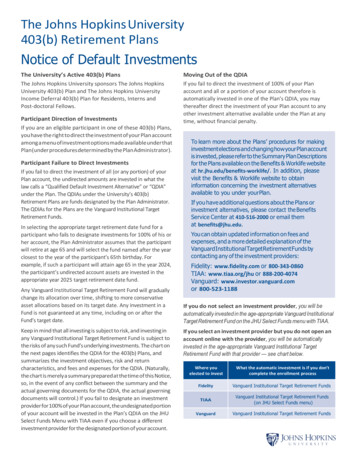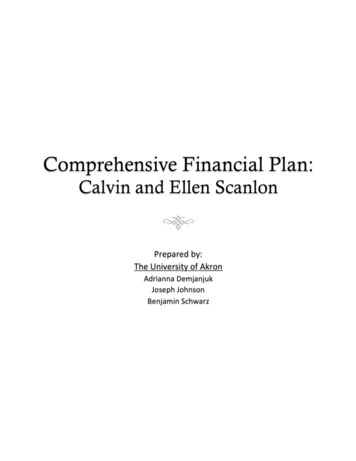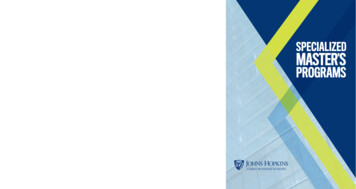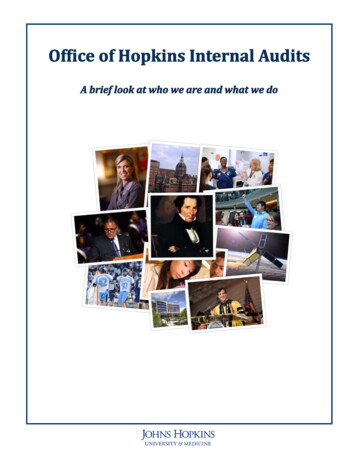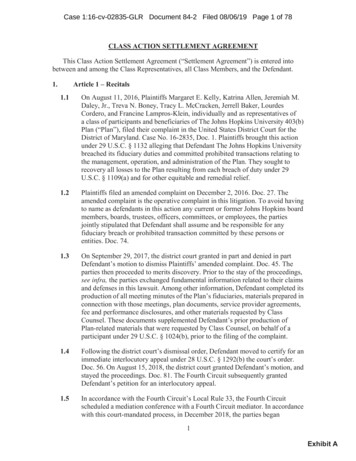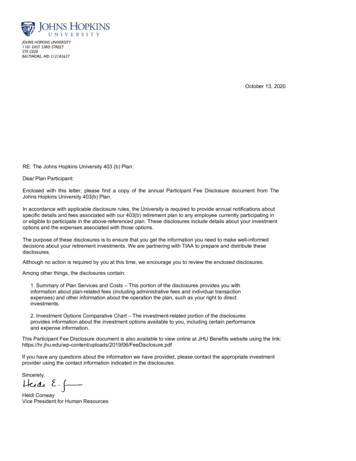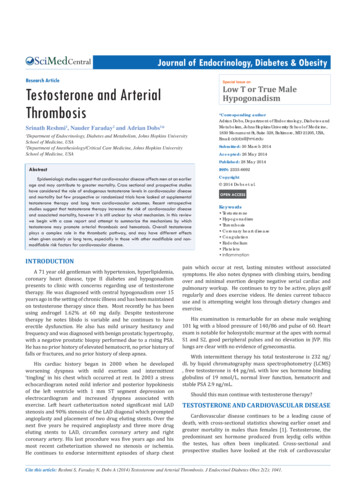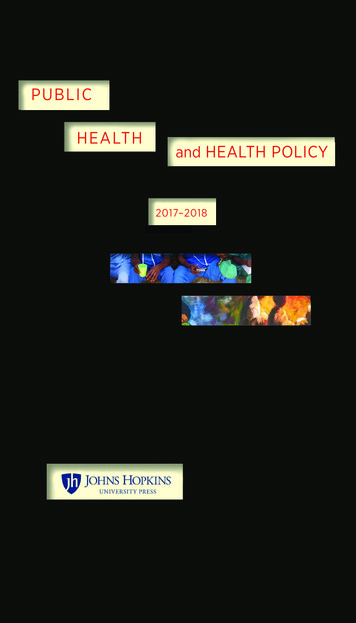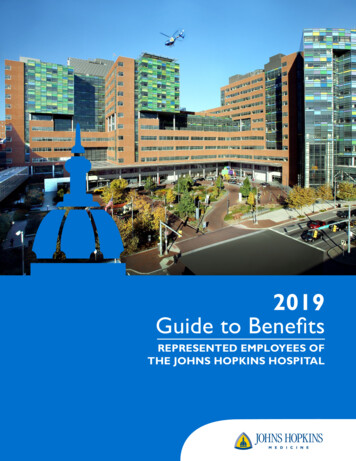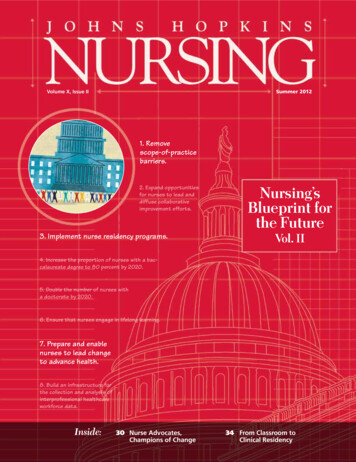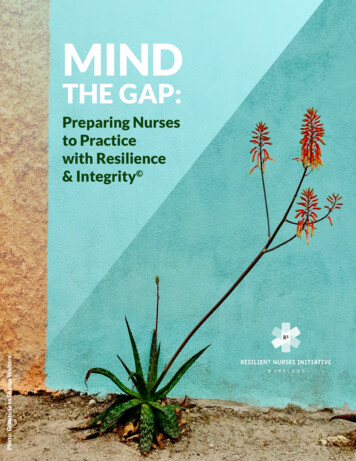
Transcription
MINDTHE GAP:Photo: Gratitude to Sharon WoltersPreparing Nursesto Practicewith Resilience& Integrity
Mind the Gap: Preparing Nurses to Practice with Resilience and Integrity Table of ContentsIntroduction .2Recommendations and Proposed Solutions Overview .5Full Recommendations and Proposed Solutions.7Conclusion.26Thought Leaders .281
Mind the Gap: Preparing Nurses to Practice with Resilience and Integrity FROM THE WIKII can practice inserting an IV on a pillow all day and night, but if I do not practice self-care and compassion, I willnot be able to satisfy my holistic role as a nurse.—Hannah H.IntroductionOne of the many things the coronavirus pandemic taught us is the importance of mentalhealth and resilience among nurses, who have been on the frontlines since the beginning.While there is so much science, technology, and protocol to be taught in nursing school,those lessons must be integrated with teaching nurses how to take care of themselves,how to advocate for their patients, how to push back against ethical lapses, and how tostay resilient in the face of overwhelming emotional upheaval. Yes, individual instructorshave these conversations with individual students. And many schools offer a seminar orclass on resilience and another on ethics. But it’s not enough. Tending to nurses’ souls andtheir integrity is as critical as tending to their psychomotor skills if we are to graduatenurses who stay the course against overwhelming odds.There are critical challenges facing the profession, not the least of which is that as manyas half of nurses polled in 2019 said they had considered changing careers.[1] And thatwas BEFORE the pandemic! At the same time, enrollment in Schools of Nursing surgedduring the pandemic.[2] This is an encouraging sign, but the bigger question is: How willwe retain and sustain the students we educate? How will we prepare faculty to modeland integrate these skills in their teaching?Nurses as individuals and the profession as a whole must find a voice, honour theircontributions, and learn the skills needed to work in supportive teams and shore up oneanother. That calls for a new paradigm for educating nurses to meet the challenges theyface with resilience and integrity. The future of the profession depends upon it.Content in the nursing school curriculum only gives passing attention to how to sustainyourself in the profession and meet the ethical challenges that will arise. Nursing2
Mind the Gap: Preparing Nurses to Practice with Resilience and Integrity students report being confident in their training only to have it eroded when they enterthe workforce. Despite efforts to bridge this gap, too many novice nurses leave theirjobs or the profession within two years. This brain drain is debilitating to the profession;stopping it is important to safe, quality patient care.To learn how nursing schools and nurse residency programs can bridge this gapand better prepare nurses in the future, the Resilient Nurses Initiative of Marylandpartnered with WikiWisdom to hear from nursing students, nurses, and educators. Theproject was funded by a Nurse Support Program II Grant administered by the MarylandHigher Education Commission and funded through the Health Services Cost ReviewCommission.Using the unique online WikiWisdom Forum platform, we asked:As a nursing student: What strategies for resilience got you through the pandemic? Howdo you expect them to help you as a nurse? What do you believe is the most valuableand usable skill, practice or method you have learned?As a nurse: What lessons from nursing school served you best during this healthcarecrisis? What gaps exist from the challenges you faced versus what you learned in nursingschool?As an educator: What are the life/work lessons of resilience you feel are most importantto share with your students/new nurses? How do you do that? What do you think arethe gaps between what you teach and what nurses need to face the challenges they willconfront?In response, 270 nurses, students and educators posted 114 ideas about how they arecaring for themselves and others and how they believe nursing education must change tomeet the demands of the future.They shared their personal stories of resilience. Nurses talked about how exercise,walks in the woods, prayer, and support from families and friends lifts them up. Nursing3
Mind the Gap: Preparing Nurses to Practice with Resilience and Integrity instructors talked about how they work with students to help them recognize andpersevere when their ethics are challenged. Students talked about managing the stressof Zoom classes isolated from their fellow students and how they found ways to interactwith patients as often as possible.From that online conversation, 7 Thought Leaders were invited to join a second phase ofthe project. They are: Tammy Bowers, Elizabeth Cushing, Amanda Krow, Nicholas Girard,Palkesh Jani, Laurie Rome, and Jenell Steele. The Thought Leaders took those stories andused them to develop the actionable recommendations included in this report.The goal is to ensure students have emotional and physical reserves, know where to getthe best advice, and can access available resources during their careers.In the words of one Thought Leader: “It’s almost like disaster planning. It’s readiness foryou as an individual, to be able to identify when you’re experiencing moral distress or anethical dilemma, and to not be alone with it, to be able to raise your voice and say, ‘Takingcare of this patient who is so close to brain dead is devastating me day after day. Help mewith it.’”4
Mind the Gap: Preparing Nurses to Practice with Resilience and Integrity Recommendations and Proposed Solutions OverviewRecommendation 1Modernize the Curriculum to Reflect 2021 Realities1.Start Nursing School with a Bird’s Eye View of the Profession2.Infuse the Curriculum with Conversations on Healthy Coping3.Allot More Time for Simulation4.Offer More Interprofessional Learning Opportunities5.Teach Nurses How to TeachRecommendation 2Make Education More Like Real Life6.Structure Classes with More Time in Clinical Practice7.Create Clinical Opportunities Outside of Hospitals8.Inject More Discussion of Resilience and Ethical Practice into Clinical Experiences9.Expand Instruction Around Ethical IssuesRecommendation 3Expand Support Systems for Students and New Nurses10. Ensure that Every Student/New Nurse Has at Least One Mentor11. Teach Students and Nurses How to Create an Effective Mentoring Relationship12. Develop More Ways for Students to Work in Supportive Teams13. Create Systems that Support Students in Their Transition to Work5
Mind the Gap: Preparing Nurses to Practice with Resilience and Integrity Recommendations and Proposed Solutions Overview (cont.)Recommendation 4Strengthen the Connections Between Studentsand Experienced Nurses14. Pay Experienced Nurses to Act as Mentors to Students15. Hire More Instructors Who are Practicing NursesRecommendation 5Support the Whole Student16. Teach Students to Advocate for Themselves as Well as Their Patients17. Teach Higher Order Communication Skills18. Demonstrate Self-Care19. Help Nursing Students and New Nurses Accept Their Human Limits20. Help Nursing Students Deal with Mistakes and Failure6
Mind the Gap: Preparing Nurses to Practice with Resilience and Integrity Recommendation 1Modernize the Curriculum to Reflect 2021 RealitiesSTATEMENT OF THE PROBLEMThe world of healthcare has changed. The pandemic has upended old patterns of teaching, learning, anddelivering healthcare. Nursing education must change too. We believe that modernizing the curriculumwill go far beyond meeting the basic requirement of producing nurses who are able to pass licensingexams. It will help us graduate nurses who are self-confident communicators, strong advocates for theirpatients, ethically-competent and emotionally-resilient people who are keenly aware of the need to takecare of themselves. To do this, we will need more robust measures of success that go beyond licensingexam pass rates and include measures of resilience and ethical competence.FROM THE WIKII have said for years, we teach the same way I was taught. How is that possible when “healthcare is alwayschanging” but we do not change the way we educate nursing students?—Tammy B.PROPOSED SOLUTIONS1. Start Nursing School with a Bird’s Eye View of the ProfessionRather than waiting until last semester to discuss the difficult challenges of nursing and offertips on self-care and building resilience, do it first, as a freshman orientation week. The week’sprogramming would feature nurses talking about the ethical challenges they have faced on thejob, experts sharing tips on building and maintaining resilience in the face of adversity, and videosof real nurses on the job, confronting ethical challenges and sharing their stories of adversity andresilience.The goal is not to blunt the natural excitement and enthusiasm incoming students feel about theircareer choice. Rather, it is to help students go into training with their eyes wide open. An effectiveprogram would give students a basic understanding of the ethical issues and challenges they willface in their careers and the skills they need for building resilience, being assertive, and takingcare of themselves. This base knowledge is something they can return to again and again duringthe course of their studies so that it is second nature when they cross the bridge to professionalnursing.7
Mind the Gap: Preparing Nurses to Practice with Resilience and Integrity 2. Infuse the Curriculum with Conversations on Healthy CopingEstimates are that 10 percent of nurses will misuse drugs or alcohol at some time during theircareer. One report suggests that “a lack of knowledge concerning substance use disordershinders the ability of nurses to identify and address signs and symptoms of abuse in colleaguesand promotes stigmas associated with substance abuse among nurses. These attitudes may deternurses from divulging the truth about their addictions, thereby preventing them from seeking thehelp they need.”[3] Honest acknowledgment of these risks in nursing school and in practice settings,creating a culture where it is safe to explore these concerns, and having transparent access toresources are needed to shift this pattern.One-off seminars on healthy coping, one-on-one conversations between instructors and stressedout students, and school-sponsored social events to help students “blow off steam” are a goodstart, but they are not enough. Discussions of healthy coping should be infused throughout thecurriculum. This may require training instructors on how to talk about healthy coping and ways tobring up the subject organically during instruction. Regular ongoing conversations set parametersand can do more to help nursing students develop healthy coping mechanisms, manage stress, anduse resources.3. Allot More Time for SimulationSimulation of real-life situations is an important part of education in training nurses how to handlepatient care. This goes beyond role-playing exercises to using simulation to help build nurses whoare resilient and emotionally ready for the challenges of the profession. Clinical simulations couldinclude scenarios that present tough ethical challenges and portray nurses who are overwhelmed.It would help new nurses build up a repertoire of how to deal with situations they may face in a safelearning environment.FROM THE WIKIFeeling completely wiped out at the end of a workday was not normal for me before the pandemic. I learnedthat I could not pour from an empty cup. If I am unable to do things for myself to ensure my well-being, I cannotgive my all to others. I learned when and how to give myself a break.—Kelly B.FROM A THOUGHT LEADEROne of the things missing for me in school was those real conversations about what healthy coping looks like: It’sokay to have a glass of wine, but not cocaine. It sounds funny, but substance use disorder in nurses is a very realthing.8
Mind the Gap: Preparing Nurses to Practice with Resilience and Integrity FROM THE WIKIAs workflow patterns were forced to change to meet the new demands in my job, I was required to change mydaily practice and the care I provided. As I began to stress over the “safe though substandard care” I felt I wasgiving (substandard on the grading scale I had created for myself), I came to a realization: I needed to extendGRACE to myself!! Yes, GRACE! I was working as a nurse during a pandemic, and I needed to give myselfpermission to bend!—Melissa W.4. Offer More Interprofessional Learning OpportunitiesNurses on the job will work in interdisciplinary teams. To prepare them for that, nursing schoolsshould collaborate often with schools that train other medical professionals – physicians, dentists,pharmacists, etc. – to create scenarios faced in clinician practice. Bringing all of the professionstogether to tackle a single problem mimics the way nurses will work when they graduate, givesstudents a deeper understanding of their colleagues in other medical specialties, and builds astrong base for understanding how to work across disciplines. These simulated interprofessionalexperiences are even more important while the pandemic limits clinical hours.5. Teach Nurses How to TeachNot everyone is cut out to be a teacher, but in clinical practice most nurses teach new graduateson the job. Often because of their tenure and experience, nurses are pressed into unfamiliarteaching roles. To be successful, they need and deserve help and support. In Schools of Nursing,new faculty may similarly lack skills in teaching and learning that are needed for the changingacademic environment. Whether teaching in clinical settings, classrooms, or virtually, experiencednurses need additional skills in sharing their expertise with others. Delivering constructive criticism,demonstrating proper technique in a more nurturing way, and empathic communication are skillsthat can and should be taught.FROM A THOUGHT LEADERI did not have the opportunity to participate in the standardized patient, or role play, until I had been a nurse forfive or six years and my mind was blown! I think in terms of resilience, feeling equipped, feeling like I was able toshow up in a way that advocates not only for my patient but for myself – that power dynamic — is something wedon’t talk about very much.FROM A THOUGHT LEADERClinicals are skills-based. Anything more depended on the instructor. I only had one who was empathetic.9
Mind the Gap: Preparing Nurses to Practice with Resilience and Integrity FROM A THOUGHT LEADEROnce a semester, the nursing, medical, and public health schools all got together. We were assigned groups andwent into a little room with other students to go over different situations. It gave us all a better insight into theother. The medical students didn’t realize the scope of practice of nurses, so it was good for them, too.Why We Think This Will WorkStudents need to graduate nursing school with certain skills and know how to perform certain tasks.But the reality is that they will do those and many other tasks as they grow into the job. Nurses whograduate with the foundational skills for remaining resilient in the face of challenge are the ones whowill best withstand the rigors of the profession. Integrating healthy coping, resilience, and integritypreserving skills into existing courses throughout their nursing program conveys that the content iscentral and not optional.10
Mind the Gap: Preparing Nurses to Practice with Resilience and Integrity Recommendation 2Make Education More Like Real LifeSTATEMENT OF THE PROBLEMNursing is a hands-on profession. It is best taught by allowing nurses to interact with real patients withreal illnesses in real healthcare settings. More seamlessly integrating classwork with clinical time isthe way to bring all aspects of nursing education together, including exposure to the types of ethicalquestions nurses will face in their careers. It’s also the best way for students to see working nursesmodel their own resilience and self-care.FROM A THOUGHT LEADERIf there’s an instructor saying, “This is edema,” and I can see edema, I can touch edema, it’s a lot more beneficialthan just talking about it and looking at a picture in a textbook. More hours in the hospital, perhaps evenblended courses, pathophysiology courses in the hospital where we see a patient, and then we talk abouteverything that was going on inside of them, means I can attach reality to the academic side of it. And I thinkhonestly, that would blend in perfectly for the NCLEX.PROPOSED SOLUTIONS6. Structure Classes with More Time in Clinical PracticeThere certainly are a lot of competing demands for the limited class time, but every hour spent ina clinical setting with real patients will be more effective than spending that same hour in a lectureor looking at a textbook. Nursing students want as much hands-on experience as they can have.Instead of adding classes, integrate skills in resilience and ethical practice into what is already beingtaught. Regularly using clinical experiences to demonstrate how to respond to the challenges allowsfaculty to model their thinking processes and resilience practices.11
Mind the Gap: Preparing Nurses to Practice with Resilience and Integrity FROM A THOUGHT LEADERThe challenge I faced when I left the hospital and moved to long-term care, you’re the only nurse. You and acouple of CNAs. There is not a physician on site. Everyone is coming to me. You have to make a lot of decisionsyou wouldn’t have made in a hospital setting because the team structure changed. My program didn’t have anylong-term care clinical placements. After a couple shifts, I was on my own.7. Create Clinical Opportunities Outside of HospitalsOnly 61 percent of nurses will work in a hospital setting,[4] but that is generally the only type ofclinical experience available to students. The school should seek partnerships with outpatientsurgery centers, public health and mental health facilities, and long-term care centers. As thepopulation continues to age, the need for nurses in long-term care and hospice will continue togrow.[5] Offering nursing students an up-close look at work in those alternative healthcare settingscould help students choose their future career path and ensure they are more prepared for theunique challenges it will present. Aligning student strengths and goals with practice setting is oneimportant way to reduce stress and ensure nursing students move through their careers withintegrity and resilience.FROM A THOUGHT LEADERAfter every clinical, we would regroup to go over the day. That might have been a good place to give you morepractice communicating in a situation like “That didn’t go the way we wanted.”8. Inject More Discussion of Resilience and Ethical Practice into Clinical ExperiencesMany clinical experiences will involve situations that challenge a student’s resilience and values.Train nursing instructors to guide discussions around ethics and resilience as a regular part of theirend-of-day discussions with students. These are the real-world situations where nurses need tofeel like their emotions, reactions, and fears are valid and that they have the resources and innerstrength to deal with those experiences. Clinical faculty can use standardized debriefing andfacilitation skills to support authentic sharing.12
Mind the Gap: Preparing Nurses to Practice with Resilience and Integrity 9. Expand Instruction Around Ethical IssuesWhile instruction focuses on teaching students to recognize an ethical problem, it is a biggerchallenge to help nurses develop the personal power and skills to address that ethical problem.In the power disparity between a physician and nurse, or a hospital administrator and a nurse, oreven a nursing supervisor and a new nurse, students need to understand what skills, resources, andsupports they can bring to bear. At the same time, the faculty should teach new nurses how to speakup for themselves and advocate for their own better treatment.FROM A THOUGHT LEADERThis is a place where education and practice often look different. I was prepared enough to be able to recognizean ethical dilemma when it was in front of me, but I did not graduate with the solutions or knowing what to do.Why We Think This Will WorkThe more students are exposed to the day-to-day realities of nursing, the more they will understandtheir own reactions to those stresses and be able to see where the gaps lie. Discovering those gaps whilestill in school means that a future nurse has the chance to ask for help from a mentor or instructor. Italso will enrich discussion of ethics content and of how to apply resilience strategies when students canbring their own life experiences to the classroom.13
Mind the Gap: Preparing Nurses to Practice with Resilience and Integrity Recommendation 3Expand Support Systems for Students and New NursesSTATEMENT OF THE PROBLEMBecoming a nurse is a journey that can feel isolating at times, a reality that was amplified by the socialseparation required in a pandemic. Social gatherings were curtailed, social networks disrupted. Addingto this isolation, students were separated from faculty and clinical resources.Still, all nurses will need a “person” throughout their career. That’s the person who always understands,the person who will explain a new process without judgment, the person who will offer comforton the bad days and help celebrate the good days. There’s a reason this was, by a large margin, themost discussed problem on the Wiki. Nurses know they cannot do this work alone. It’s too hard, tooemotional, and can take too big a toll. Developing a support network beginning in nursing school sets thestage for the entire career.PROPOSED SOLUTIONS10. Ensure that Every Student/New Nurse Has at Least One MentorWhether this is a student-to-student mentor, a teacher-to-student mentor, or a nurse-to-studentmentor, every student should have at least one mentor who follows him or her through schooland into the workforce. Ideally, each student would have at least two mentors – a student mentorand a professional nurse mentor. If new nurses come into the workforce without a mentor,FROM THE WIKIAs a nursing student I was taught all the basics of nursing care. As a nurse, I was taught to refine my nursing careskills. As a nurse educator, I teach resilience in nursing.On my journey, I learned that we as nurses need a community to share our experiences and stories. We need oneanother in order to be resilient and remain not only at the bedside, but in nursing. This is how we learn and growin our profession and as people.The largest gap that existed for me was not knowing or realizing the importance of an outlet to discuss whatI had witnessed as a nurse. Many things are not appropriate for dinner discussion with the family. I had ameltdown at dinner one evening with my children present. This is when I had the “aha” moment.—Jennie A.14
Mind the Gap: Preparing Nurses to Practice with Resilience and Integrity FROM A THOUGHT LEADERIn my undergraduate, prior to nursing school, we had what we called a “sister class.” When I came in as a firstyear, a third year was assigned to me. Then, during my second year, I saw my big sister off and I became amentor that following year. It was kind of embedded that you had support going in, and then you anticipatedbeing the support for someone else later on.FROM THE WIKIAs a new nurse, there are some shifts that are more challenging, more stressful, more emotional, more physical.just MORE, than others. A lesson is learned with each new experience, but you can also feel deflated, tired,stupid, and impostor syndrome can take away any confidence you had in your blossoming nursing abilities.Having a good team can help to make a perilous situation seem like a puddle instead of a tsunami. Being ableto turn to someone with more experience to explain the situation, express your frustration, and have themunderstand helps to validate your feelings and reassure you that one day you, too, will feel like a “real” nurse.—Danielle S.healthcare organizations should create meaningful opportunities for mentorship relationships to beestablished.Not everyone will be able to find those mentors on their own, so it should be incumbent uponthe school to assign each student a student mentor who is a few years ahead in school. Then, inthe best of all worlds, the school would recruit enough working nurses to assign each student anexperienced nurse as a mentor as well. (More on that in the next section.)11. Teach Students and Nurses How to Create an Effective Mentoring RelationshipNurses don’t always know how to be a good mentor and students may not know what they canexpect from the mentoring relationship. Developing programs to prepare nurses in all roles andspecialties to serve as mentors for students and new nurses creates accountability and consistency.Likewise, educating students about how mentors can and should support them will empower themto ask for the support they need. A required session that the mentors and mentees attend togetherwould give everyone a strong base for developing a beneficial relationship.15
Mind the Gap: Preparing Nurses to Practice with Resilience and Integrity 12. Develop More Ways for Students to Work in Supportive TeamsTeam learning experiences should go beyond group class projects. And they must be augmentedwith skills in communication, conflict management, and negotiation. To achieve this, nursingstudents should be assigned to teams or encouraged to develop their own teams throughout theirstudent careers. Their professional careers are likely to be spent working in teams – both groupsof nurses and interdisciplinary teams across healthcare professions.[6] Learning to support oneanother, teach one another, compensate for one another’s weaknesses, and celebrate one another’sstrengths is a skill that should be taught and honed while in nursing school.FROM A THOUGHT LEADERBefore I started my program, someone from student affairs sent an email saying, “We have this peer mentorprogram. If you want to apply, fill out a form.” It was completely voluntary. I was all for it. After I applied, I gotanother email, “OK, here’s the name and contact for your mentor.” I got set up with someone in her 3rd semesterwhen I was in my 1st. We never really had any formal meetings. It was more like shooting the breeze, she gaveme some of her notes and study tips. It was helpful, but it could have been better if it was more structured.FROM THE WIKII encourage my students to find their support system as I did, whether it is a person, people, or even a pet. Askingfor help as a nurse is important while working on nursing tasks but is even more important when dealing withthe emotions of being a nurse. This is how we keep coming back because we have safe hands to rest in when weneed time to regain our strength.—Elizabeth C.When the pandemic started, I had the opportunity to lead 150 Sailors, Officers, and civilian healthcare workersin the Emergency Department of one of the Navy’s only trauma centers. What worked for our teams wasEVERYONE FELT HEARD, constant FEEDBACK WAS GIVEN/TAKEN, and there was a BALANCE as the tasks/assignments stacked up. Every member of the team knew each other well enough to know when we had tolighten up or could press on.This worked in ensuring there were no cracks in our resiliency as individuals or as a cohesive team on the floorthat would compromise patient care or the mission. This constant closed loop communication among all levelsof leadership and individuals is something I feel needs to be emulated in the school setting as well, especiallyduring these unique pandemic settings.—Max O.16
Mind the Gap: Preparing Nurses to Practice with Resilience and Integrity FROM THE WIKIWe have to trust each other every day to provide care for our patients and their families. Now, we trust eachother to maintain vigilance in our lives so that we can protect each other from contracting the virus. As a personwho falls into a few high-risk categories, I need to trust that my colleagues will protect my life by being cautiousthemselves. (Just pause for a moment to reflect on that last statement . That it is a distillation of fact, and nothyperbolic or inflammatory.)—Laurie R.As a new nurse, I would offer to nursing students the advice to forgive yourself of the things you weren’t able toaccomplish and take pride in the small daily victories. Becoming a nurse is a process and each day you learn newthings.—Julie T.FROM A THOUGHT LEADERWhen I had my first patient expire, I had no idea what to do and they just assigned me to my next patient.13. Create Systems that Support Students in Their Transition to WorkAsking for help is often viewed in nursing as a sign of weakness. It’s easy for new nurses to feeloverwhelmed and alone once they leave school and enter the workforce. The first time they haveto deal with a patient death, are assigned a task they have never performed, or face an ethicalchallenge, they would have a support system in place. This support system would
Mind the Gap: Preparing Nurses to Practice with Resilience and Integrity 6 Recommendation 4 Strengthen the Connections Between Students and Experienced Nurses 14. Pay Experienced Nurses to Act as Mentors to Students 15. Hire More Instructors Who are Practicing
